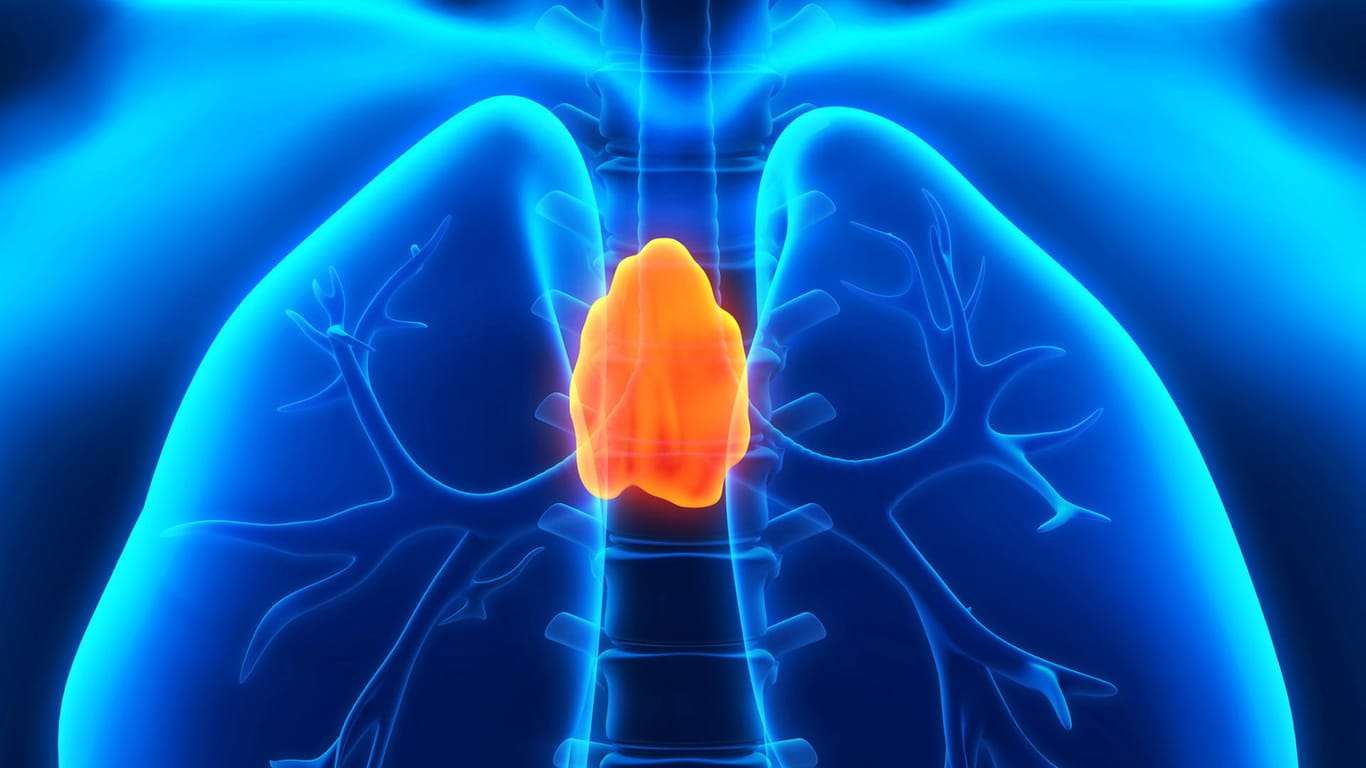The thymus gland produces defense cells and eliminates maldeveloped cells. If the thymus overlooks immune cells that are mistakenly directed against the body’s own tissue, this has far-reaching consequences for health .
Doctors differentiate between the innate and the acquired immune system. While the innate immune system represents the first immune barrier and is specialized in the rapid defense of certain groups of bacteria and viruses, the acquired immune system continually learns over the course of life, produces new immune cells and can adapt to and defend against an infinite number of foreign cells. The thymus is an important part of the adaptive immune system. What tasks it has and what happens if it doesn’t work properly.
How does the thymus gland work?
In the thymus gland, also called thymus and sweetbread, the immune cells receive their imprint, i.e. their immunological memory for certain antigens. The T cells, also called T lymphocytes, are created. They form a group of white blood cells that serve the immune system. Together with the immune cells formed in the bone marrow, the B lymphocytes, they form the basis for the body’s acquired immune response. The thymus, along with the bone marrow, is called the primary lymphatic organ .
The precursors of T cells come from the bone marrow. From there, the still immature lymphocytes migrate into the thymus. There they differentiate into a large number of T cells with different tasks before the thymus releases them into the entire body as mature immune cells. There they detect antigens. All of this is controlled by a complex interaction of different genes.
What are the functions of the thymus gland?
“The thymus gland has two important tasks. On the one hand, it produces defense cells, the T-lymphocytes. On the other hand, it filters out and inactivates self-reactive cells, i.e. immune cells that are mistakenly directed against one’s own body.
- The immune system : structure, function and importance
The thymus is the quality control of the immune system,” explains Dr. Thomas Boehm, director at the Max Planck Institute for Immunobiology and Epigenetics in Freiburg and member of the German Society for Immunology eV (DGfI).
The thymus is particularly active in children
The thymus gland is particularly active in babies and small children because the immune system has to do a lot to build up the defense system. In the first years of life, the body’s own immune system is confronted with a particularly large number of pathogens and must be correspondingly active in order to build up protection. In babies, the thymus gland, which lies above the heart, covers the entire heart. In adults, however, it has shrunk significantly.
“This is because the thymus of an adult has to produce fewer defense cells. On the one hand, because defense cells are produced in reserve. On the other hand, because most pathogens that cause illness are already known. The thymus is like a muscle: the less it is used, “The smaller it becomes. But that doesn’t mean that it isn’t active in adulthood. If necessary, it produces more immune cells,” says Boehm.
Consequences of a diseased thymus gland
If the thymus gland becomes ill or overlooks self-reactive cells, this has consequences for health. Then it’s not just the immune system that is weakened. If incorrectly coded cells that are directed against the body leave the thymus and enter the body, a certain trigger can lead to the outbreak of an autoimmune disease. “For example, autoimmune diseases such as type 1 diabetes mellitus , rheumatoid arthritis, multiple sclerosis and psoriasis can be traced back to a malfunction of the thymus,” explains Boehm. “Once the misdirected immune cells start floating around i
Can the thymus gland be strengthened?
According to the immunologist, there are no ways to specifically strengthen the activity of the thymus gland or support its function. “You cannot influence the thymus gland. But you can take measures that can strengthen your immune system in general,” says Boehm. “A healthy and balanced diet, plenty of exercise, healthy sleep and not smoking are some examples.”
n the body, there is no turning back. Then certain triggers, such as infections, can activate them.”

